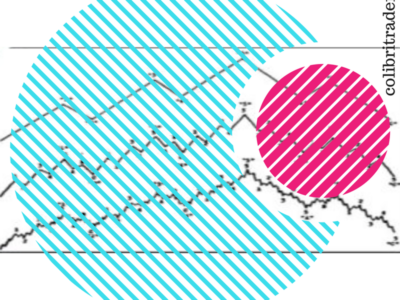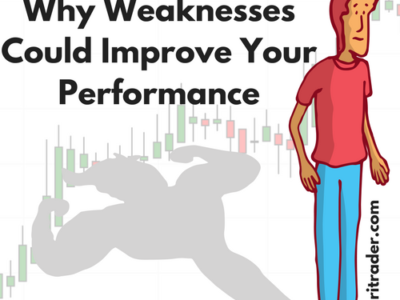Managing Your Emotions
Why do you trade?
In my experience and for the broader population out there, for many it is to experience the adrenaline rush when the market moves in their favour? For some it’s a game of wits, where they try to outsmart the market. Some people are just wanting to change their stars.
My own core belief is that the market is a source of generating true wealth.
Regardless of the various motives and whatever the reason, I think we can all agree that many participants go through a flurry of emotions every time they pull the trigger on a trade. In that instance of time, we all become a “professional” trader all
of a sudden.
In fact I remember as if it was yesterday, my first introduction to having proper “skin in the game”.
The Day I Learned This Lesson
In 1998 at the age of 24 I was fortunate enough to be accepted onto the graduate training program of a major bank. I was one of a handful of people who were placed inside the dealing room of the bank on a rotation basis across all the various trading desks.
By then I had already had a good few years of “investing” in the stock market under my belt. In fact, the financial markets have always been in my blood. I recall that in primary school, well before the invention of internet and websites, I used to run to the school library over break to check up on what the sugar prices did the previous day. Though too young to trade yet, I instinctively knew that I liked the markets.
In any event, so here I am, sitting on the gold desk amongst some of the most seasoned bankers/traders. I recall at the time the bank had probably one of the most well renowned and globally respected commodity dealers employed heading up the trading desk. This guy was phenomenal. His trading skills were only surpassed by his ability to do mental maths. He used to walk past his traders and each was to shout out their individual book positions and by the time all were done shouting out their net positions, he would be able to calculate the average position of the entire desk right there in his head!!!
Anyway – so sitting on the desk, next to the traders I found myself looking at their trading screens ever so often, but mostly listening to the general chatter between them and other market participants and clients. Soon enough the head trader (Mental Math Guy) sat down next to me and said, “so have you been following the gold market of late?”. Me, in true form and being the smart-arse that I am did not skip a beat and began to tell him my views on the market.
My First Big Trading Ticket
So without any emotion he asked, “so if you could,.. would you go long or short here?” (Long as you will later learn is to buy the particular instrument, where short is to sell).
I blurted out, “of course I’ll go long….”
At that very moment Mental Math Guy leans into the squawk box (which is basically an intercom system connecting his desk to the brokers) and shouted, “mine at the figure please”.
He calmly turned to me and said – “lets see how this turns out” and proceeded to shout out this newly opened trade to the position keeper on the desk as he got up and walked away.
WHAT JUST HAPPENED??????????????????
I felt this unbelievable rush of adrenaline. I was completely out of my depth. From the second he left I was literally GLUED to the trading screens. I recall watching every single pip the market price moved with, every up-tick giving me a sense of relief and a down one, an agonising sense of “oh crap”!!!
I could not believe why the other traders around me just nonchalantly went about their business. Surely they were running positions a thousand times larger than mine. How can they be this calm?
Unbeknown to me Mental Math Guy was teaching me one of the biggest lessons, and by far one of the most important ones of my entire financial career.
He was never interested in the outcome of my trade, and in fact, it was absorbed into the total desk position without me ever being asked if I was right or wrong.
Finding Your Level Of Trading Comfort
Being right was not the goal. In fact, losing is part of winning when it comes to trading, and the sooner one accepts this fact the better.
Instead, what he wanted me to realise was that I had an internal level of trading comfort. A personal “stressometer” above which trading is a VERY uncomfortable game.
Trading a position size above your comfort level puts you in a position of internal anguish and stress. It will make you blind to reality and leave you with only one single, laser-like focus on one desired outcome,.. to survive the trade!!!
Fact is, you will be so stressed that taking a loss will not even be an option to consider, one will much rather add to a losing position in the hopes to trade your way out of it, than to see a loss of that magnitude. THE ABSOLUTE WORST PLACE TO BE!
The Importance Of Taking Things Slow
I very quickly learnt the importance of people spending time as interns on a trading desk, then from there go on to be a junior trader, and slowly working their way up over time to trader level, and eventually senior trader etc. I did not realize it in the moment but looking back can see the logic of allowing an individual the space to build their mental agility and confidence.
For this very reason I will show you at some later stage exactly how to curb your own fears, how to protect yourself FROM yourself. How to manage risk and trading size so that every trade is “just another trade”. You will never be held hostage by one single trade, or collective position. This is a crucial space to operate from as only in this space can one make free and clear (emotionless) decisions.
The reason this is so important is that trading can add an immense amount of stress to your daily life if your goals are not aligned with who you are, personally at your core, your own tolerance for risk and appreciation of reward. If there is a massive mismatch between your core being and your trading style you will find yourself forever chopping and changing strategies trying to chase the next trade while balancing this level of discomfort. Sleeping soundly will be something you’ll recall doing BEFORE you started trading.
This often can be avoided by following this simple step.
What Is Your Trading Personality
Measure your success in the market, against the real reason you are in the markets in the first place.
If you are only there for the thrill of the ride then I would bet that your emotions towards trading can be compared as neural to that of you towards gambling.
For most of us though, this reflection often brings with it a sense of frustration trying to align these two worlds, I know,.. I’ve been there.
Often a slight course-correct is necessary, and it could be as simple as a different trading style or adjusting the size of the positions you take! It is far better to fix any misalignments now when you are starting out, than to continue onwards on your journey without
any clear direction of what you want from trading.
In the end, the only way you will end up trading over the long term is if you feel a sense of progress, motivation and achievement from your actions. Yes, there will be down days for sure as well, but if all you are doing is holding on to your seat while experiencing a white-knuckle ride in the markets every single time you trade, I can bet you that this too will be a short lived venture.
I find that the best way for me to tackle this was to accept the fact that I was not in it for the short term. That I wanted to build wealth consistently, so my focus was not on finding something that worked once, but instead could be repeated regardless if markets goes up, down or sideways.
A good friend once told me, never try to boil the ocean, boil a cup of water at a time.
Such a simple statement, but its power lies far deeper than just the act of simplicity. First, it allows you to succeed, which is critical. One is far more likely to continue with something if you have achieved small, frequent and measurable successes. Boiling a cup of water allows you to see results, and get the emotional validation that you can do that step, which allows you to move on to the next….
Trading is similar.
You are not there to win every single trade, you are not there to beat the market. Accept that it will eat you up and spit you out quicker than you can say “lets double up and swing for the fences”.
Fundamental Requirements For Successful Trading
Trading requires four fundamental concepts:
- Capital, and the fierce preservation thereof
- Control of your emotions
- A trading plan / strategy
- Time
The truth is that if you are aiming to achieve significant wealth from your trading activities, you really can’t focus on any single one of these, but instead, constantly need to balance all four, like balls in the air at the same time without letting one fall.
For beginners the best way is to find a proven “time tested” strategy that fits their personality and trading style. Set a realistic goal for your first year of trading and just stick to it. Spending the time to hone your skills will never be time wasted.
As much as I had to learn what my own “stressometer” levels were, you still have to. Use the time when starting out to find your feet. Consistency being the key.
Also remember that a strategy never unfolds if you change the goals half way through. Don’t look for 20 new ways of trading the market. If you are a professional, then great, fine to play around and tweak your model, but for most this is a fundamental gem of advice which will help you to remain focussed, fiercely preserve your capital, gain consistency in your success, all of which contributing to a healthy
trading state of mind.
Don’t forget the final key ingredient. You NEED TIME!!!! You cannot treat the market like it’s your own personal lottery machine. Later on you will come to realise that the market has a very real and complicated function, and for you as a single small time player, it is completely unrealistic to expect the market to work in your favour at all times allowing you to make millions in a matter of months.
Phenomenal Traders Do Exist
Don’t get me wrong, there are some phenomenal traders out there. I had the privilege at one point in my life to work alongside a phenomenal trader. In fact, he was the “side kick” of Michael Marcus, a world-renowned turtle trader, during the time when he turned $30,000 into $80,000,000 in a matter of a few years. (In fact I highly recommend you reading about Michael and the other Turtle Traders if you have the time).
But realise this, that for every single person you ever hear of doing that, you probably can expect to read about hundreds (if not thousands) who have spent their life savings on risky bets trying to catch the next trade, though realistically the chances of all them publishing their failure for all to read about is probably slim, but you get the picture .
Once you get to the point where you realise you are in this for the long haul, then the result of the very next trade you are about to take becomes a bit less daunting. If you keep these trade sizes within your own “stressometer” levels then it should be easier for you to accept losing trades as part of a winning strategy.
The post Managing Your Emotions appeared first on My Dad The Trader.
Source:: Managing Your Emotions














